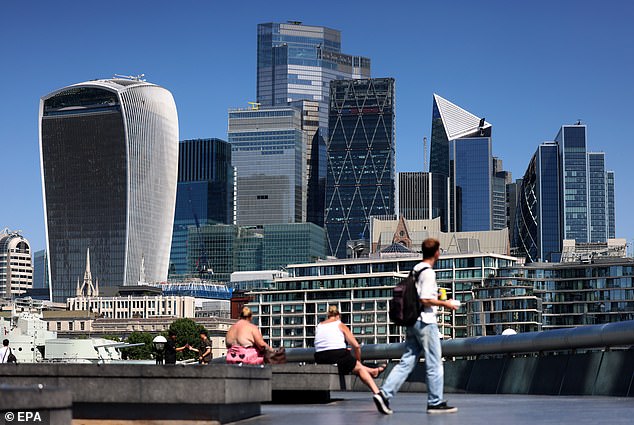The FTSE 100 soared past the 9,000-mark for the first time yesterday capping a stunning rally that has provided a much-needed dose of optimism for the beleaguered UK stock market.
London’s leading index rose to just under 9,017 to add to an impressive run that has seen it climb by more than 10 per cent so far this year, outperforming Wall Street rivals.
However, the Footsie later reversed course to end 59.74 points, or 0.7 per cent, lower at 8938.32 – highlighting the continued fragility of the market as investors grapple with global upheaval.
That came after figures showing an increase in US inflation raised fears that Donald Trump’s tariffs are starting to take their toll.
And the start of Wall Street’s earnings season presented a mixed picture to investors with Jamie Dimon, the world’s most powerful banker, warning that despite a boost from tax cuts and lower regulation, trade uncertainty and global tensions posed ‘significant risks’.
However, the Footsie’s surge past the 9,000 level still marked what was described as a ‘major achievement for the UK’.
City rally: The FTSE 100 rose to just under 9,017 to add to an impressive run that has seen it climb by more than 10 per cent so far this year, outperforming Wall Street rivals
It comes despite companies continuing to depart the market – either to switch listings to New York or by accepting takeovers – at a time when there is a dearth of new listings to replace them.
Dan Coatsworth, investment analyst at broker AJ Bell, said: ‘It took eight years for the FTSE 100 to go from 7,000 to 8,000, yet only two years to break through 9,000.’
Susannah Streeter at Hargreaves Lansdown said: ‘The Footsie has been fired up partly by its defensive nature as more investors appear to be seeking shelter from potential volatility in the US and the unpredictability of the Trump administration.’
Markets on both sides of the Atlantic have hit record highs recently, recovering from a sharp sell-off in April when Trump’s ‘Liberation Day’ tariffs threatened to upend the global economy and boost US inflation.
Trump has since retreated on the worst of his threats, though tariffs are still much higher than they were before.
And, yesterday, fears that the charges would start to push up prices for US consumers appeared to start to manifest as inflation in the world’s biggest economy rose to 2.7 per cent in June – up from 2.4 per cent in May and the highest level since February.
Economists pointed to rising prices for clothes, toys and other goods that tend to be imported from other countries.

In New York, the S&P 500 and Dow Jones indices were trading lower last night, though the tech-heavy Nasdaq was still up.
It came as results from some of America’s biggest financial firms gripped investors.
JP Morgan’s quarterly profits fell 17 per cent to £11.2billion – but that beat expectations and it raised expectations for the full year after strong results in investment banking and trading.
Market activity surged as traders responded to Trump’s tariff manoeuvres.
Dimon, JP Morgan’s chief executive, said: ‘The finalisation of tax reform and potential deregulation are positive for the [US] economic outlook, however, significant risks persist – including from tariffs and trade uncertainty, worsening geopolitical conditions, high fiscal deficits and elevated asset prices.’
DIY INVESTING PLATFORMS

AJ Bell

AJ Bell
Easy investing and ready-made portfolios

Hargreaves Lansdown

Hargreaves Lansdown
Free fund dealing and investment ideas

interactive investor

interactive investor
Flat-fee investing from £4.99 per month

InvestEngine

InvestEngine
Account and trading fee-free ETF investing
Trading 212
Trading 212
Free share dealing and no account fee
Affiliate links: If you take out a product This is Money may earn a commission. These deals are chosen by our editorial team, as we think they are worth highlighting. This does not affect our editorial independence.


